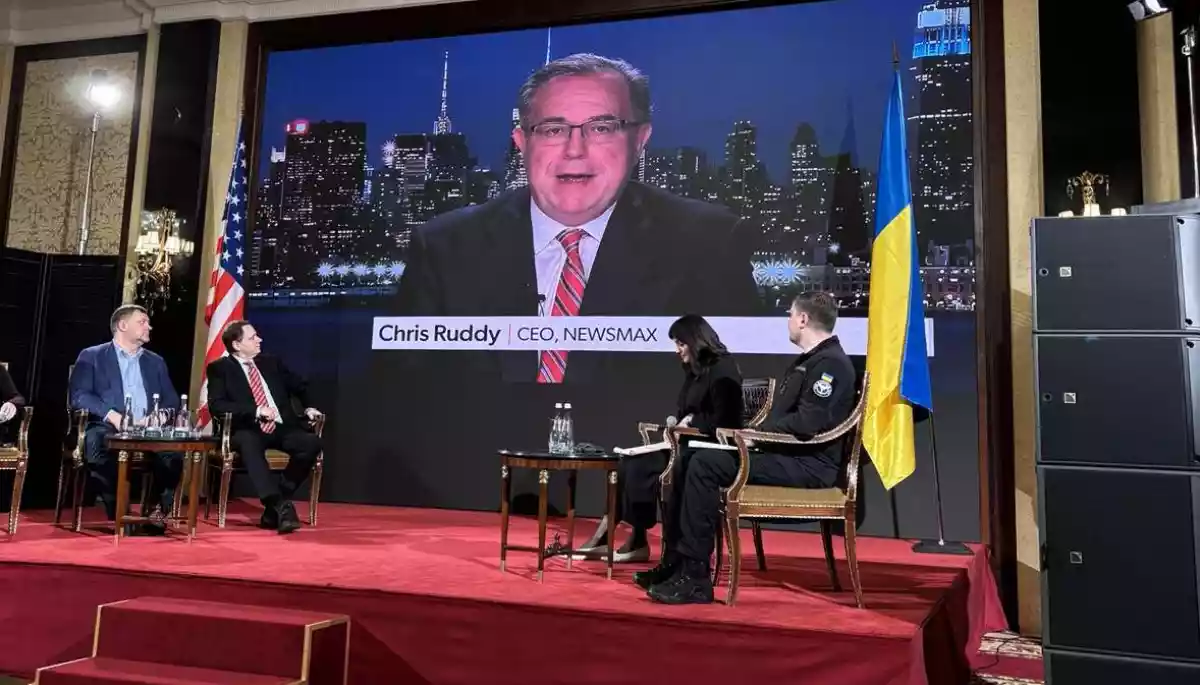
A coordinated attack on the independent Ukrainian media. Who is turning Ukrainians against the media and why?
A coordinated attack on the independent Ukrainian media. Who is turning Ukrainians against the media and why?


Detector Media (DM) regularly investigates the so-called "anti-Western" or "anti-democratic rhetoric." Its number in the Ukrainian information space is growing, and pro-Russian forces in Ukraine are increasingly integrating Russian messages into anti-Western ones. Such rhetoric’s authors seek to discredit the collective "West", i.e., Europe, the United States, NATO, and the entire democratic world by saying that they, under the guise of democracy, have taken Ukraine under "external control". In general, we hear theses about "external governance" primarily from Russia, particularly from the Russia’s President Vladimir Putin statements.
Examining the Kremlin's disinformation on Ukrainian social networks, Detector Media saw that the narrative of "external governance" regularly mentions independent Ukrainian media, which, according to propagandists, are allegedly guided by the West. Therefore, Detector Media analyzed about 2,500 posts on Facebook, Telegram, and Twitter using elements of artificial intelligence to identify which Ukrainian media are targeted by the Kremlin, which discrediting methods it uses, and which alternatives it offers.
Sources: Ukrainian segment of Facebook, YouTube, Telegram, and Twitter. By Ukrainian segment, we describe posts of profiles, pages, groups, and channels that are located in Ukraine or have indicated their location in Ukraine.
Period of analysis: September 2021 — January 2022.
Read more about the research methodology here.
We have seen attacks on independent media on social networks in 2021. However, in early 2022, propagandists on social media wrapped the narrative of "Western-led Ukraine" into a new context — a possible Russian invasion; and led to the fact that "Soros's protégés create political and economic crises so that either he personally or the collective" West" can earn ." In this case, pro-Kremlin correspondents explain that "the Western media and Soros are fueling the conflict with Russia", so that "Ukraine will carry out Soros's instructions." At the same time, social media users are trying to persuade the West to use media to promote anti-Russian ideology and talk about aggression. In contrast, "Russian liberal media teaches humanism."
Numerous labels are used to identify the media and individual members of the media or the public sector who are being discredited, such as "clientele", "foreign agents", "Western agencies", "foreign agencies", "Western reptiloids", and "grant suckers", "grant eaters". However, the most popular of them are still derived from the name of the American financier George Soros: "sorosMedia", "sorosyata", "proteges of Soros", "adherents of Soros", "sect of Soros witnesses", "mouthpieces of Soros", "sorosobots".
Which Ukrainian media is Kremlin discrediting on the social networks?
The main criterion for choosing which media to attack by the pro-Kremlin users is its connection with the collective "West". Whether it is a grant that the editorial office received from a foreign donor or if the media’s employee has ever studied in Europe, the United States, or Canada. At least, this is how the pro-Kremlin pages and channels explain it themselves. However, they attack mostly either the major media, whose rhetoric contradicts the pro-Kremlin one, or people and organizations that expose disinformation spread by the pro-Russian sources. The only thing that, in fact, unites these media is not their "serving to Soros", but a transparent editorial policy and its funding model.
Conventionally, those who were attacked can be divided into three categories: media and media projects, donors and foundations that support the development of independent media, and NGOs that specialize in various aspects of the media. Among the first category, the following media were attacked the most: Ukrayinska Pravda (UP), Dzerkalo Tyzhnia, Nashi Groshi, and Bihus.Info, Slidstvo.Info, Schemy, Zaborona, Hromadske, Ukrinform, Slovo ta Business, Liga.net, Novoye Vremya (NV), Suspilne, Crimea.Realities, Radio Liberty, Detector Media, and the Institute of Mass Information.
Among donors and foundations, pro-Kremlin social media pages and channels mostly discredited USAID and the Internews. The International Renaissance Foundation is also often discredited, but rarely in the media context. In the public sector, Detector Media was most frequently attacked (discredited as both a media and a public organization), the Institute of Mass Information, The Journalism Development Network, the Ukrainian Press Academy, the Committee to Protect Journalists, and the International Consortium of Investigative Journalists.
Throughout 2021, we can see the growing confidence of the pro-Kremlin Telegram channels. While in the past, they paid more attention to explanations and examples of why certain media or media outlets cannot be trusted, now the pro-Kremlin Telegram channels have begun to openly and directly proclaim that those they consider "sorosyata" should not be trusted. Increasingly, we also can see the arguments styled as "because we said so." For example, the "Under the Mantle" (Под Мантией) Telegram channel announced in November that it would protect "all those who are humiliated by sorosyata", which was explained this way: "If sorosyata offend someone, then those are normal and decent people." Direct calls not to trust anyone associated with Soros by the Telegram channels may indicate that administrators are confident in the loyalty and support of their audience.
The argument in favor of a coordinated attack was the creation of a MediaKiller Telegram channel — (@ MediaKiller2021 with 56 thousand subscribers), which specializes in the media topics. This channel often includes criticism of the government and its communications, discrediting the independent media, alongside the Kremlin's narrative of "external governance." It is noteworthy that the channel with the same name exists also in the Russian Telegram segment.
Ukrainian MediaKiller channel sharply gained subscribers only after its first fourteen posts in August 2021. Already in September, the newly created channel had more than 45,000 subscribers. The list of those quoted by the channel is eloquent. For example, on February 8-10th, the channel reshared messages from such Telegram channels as "Naglyi" (Наглый) - personal channel of Max Nazarov, the leading host of "Nash" channel, and the Russian network channels exposed by the SBU (Security Service of Ukraine), such as the "Resident" (Резидент) and "Spletnitsa" (Сплетница).
What methods does the Kremlin use to discredit the independent media?
The division into Us vs. Them. By using various labels such as "soroSMI", the propagandists immediately oppose themselves to a group led by the mythical "West". They present themselves as fighters for the truth, and the independent media as those who hide the truth from Ukrainians. Pro-Kremlin media and Russian Telegram channels portray themselves as "Robin Hoods" of Ukrainian information space.
"Blocklists and allowlists". Pro-Kremlin contributors publish lists of media worth reading alongside the names of those that should not be trusted. According to them, the latter are the "servants of Soros." Allowlists (formerly/or also called "whitelists") are common for specialized media organizations that monitor compliance with journalistic standards. For example, Detector Media regularly monitors compliance with standards in the prime-time newscasts of eight national television channels. However, the significant difference between the monitoring of relevant organizations and the lists that the pro-Kremlin pages distribute is that the former have clear criteria for evaluation and expertise, while the latter desire to discredit ideological opponents.
Usually, more general messages without any credible details are used to discredit the ratings of the media. For example, the pro-Kremlin media put "only their publications" in the first place of the ratings to "form their honest image in society." The propagandists applied this principle to the online media allowlist from the Institute of Mass Information. One of the last arguments used by propagandists to confirm their position was that the "allowlist" of Ukrainian online media included "Bukvy", whose former employees accused the leadership of "toxic atmosphere and humiliation in the editorial office", its involvement in discrediting Zelenskyi, persecution of the Member of Parliamen Vyacheslav Sobolev, conducting Ilya Kiva's election program and businessman Pavel Fuchs' Telegram channel, etc. Bukvy’s co-owner Petro Terentyev denied the allegations. However, Bukvy appeared in the rankings a long time ago, when the editorial board was run by other people (Tetyana Nikolaenko and Danylo Romanchuk), and its publications mostly adhered to journalistic standards.
The principle of "You are a fool". Propagandists often go the other way. They conduct thorough research that shows that certain media or pages are spreading misinformation, and they say that these are the media that are worth reading. If the "grant eaters" attack them, then they are the trustworthy media. When Detector Media published a list of Telegram channels spreading anti-democratic rhetoric, some of these channels wrote about the list as a plaque. In the personal Telegram channels, Max Nazarov (host of the already sanctioned TV channel "Nash"), Diana Panchenko (host of the sanctioned First Independent and Ukrlive), Olesya Medvedeva (employee of the sanctioned publication "Strana.ua"), Vasyl Apasov (APnews) – all ridicule the relevant materials, trying to present those "as a victory and the highest appreciation of their work", and sometimes they even resort to the humiliation of these outlets. Less often, however, the pages of pro-Kremlin media on social networks enter the discussion and try to analyze the research and show why the its conclusions can not be trusted. Such tactics are scarce because there are not many arguments in the arsenal of propagandists to cast doubt on thorough research, so more often, they choose the principle "well, because you are a fool."
Anonymous Telegram channels are quick to respond to information about themselves from the media and government institutions. They are often defending themselves using the argument of "misunderstanding Telegram’s operations." They state that all these researchers and civil servants simply do not understand the meaning of Telegram (as a social network). In this context, there are often similar messages about the media and the President's Office, which "failed to create their own influential Telegram channel, so now they discredit "Resident" (Резидент), "ZeRada" (ЗеРада), Shariy (Шарій), "Whisperer" (Шептун), and others.
Taking the role of the "victim". Pro-Kremlin pages and social media channels are trying to portray themselves as victims of attacks from all sides, both by the Office of the President (OPU) and Soros. In general, the topic contains controversial messages because, on the one hand, they position themselves as those who are attacked, i.e., the weaker, and on the other — influential enough to be the only opposition to Zelenskyi and the "SoroSMI". In addition to the belief in the alleged cooperation of independent media and the President's Office, we can see such messages as "attacks by Soros on Zelenskyi." This message was especially popular in late fall, when many articles and investigations were published about the OPU, Zelenskyi himself, and related officials or initiatives. To convince the audience, they use entirely different cases, depending on the events — from Wagnergate and the film "Offshore 95" to the investigation about the chairman of Ukreximbank Yevhen Metzger and the Deputy Secretary of the National Security and Defense Council Ruslan Demchenko. All messages of the "media attacks against Zelenskyi" have been concluded to the idea that the West "is ignoring Zelenskyi." This pro-Kremlin narrative also roams from event to event — the president is allegedly "ignored" at the behest of oligarch and media owner Rinat Akhmetov or the financier George Soros himself. "He is ignored" so he will be forced to fulfill the orders on the "Donbas case" or the extradition of Ihor Kolomoiskyi and Hennadyi Boholyubov; "he is ignored" to weaken the official power and remove him (Zelenskyi) in the future.
The lack of OPU’s reaction to certain publications is explained by its fear of Soros and USAID-funded media. Meanwhile, the "boldness of some media outlets" is explained by the fact that they are "not afraid of the authorities because Soros or the Western embassies protect them." In particular, Max Nazarov describes it this way: "If the West finances you, you are a sacred cow." On the other hand, he says that other media who "do not have embassies as their patrons" allegedly do not receive such support.
Suspilne and, in particular, the Supervisory Board of the National Public Television and Radio Company of Ukraine (NSTU), its chairman Svitlana Ostapa, and the chairman of the NSTU board, Mykola Chernotytsky, are also accused of war with OPU. In general, the context of "external management" and discrediting supervisory boards at any Ukrainian institution is a relatively common practice of propagandists. However, these reports are usually reduced to accusations of certain representatives of supervisory boards in their decision-making in the interests of Western structures. Meanwhile, in the case of NSTU, it is blamed for "squandering budget money." According to the pro-Kremlin pages and channels, the conflict between NSTU and the President's Office began a long time ago because the authorities wanted to control Suspilne’s operations and activities. At the same time, the NSTU's supervisory board thwarted the OPU's plans and allegedly "protected the one-off budget spending on the National Public Television and Radio Company of Ukraine."
"Silence Spiral". Pro-Kremlin social media users attributed this tactic to the Ukrainian independent media and NGOs. They unequivocally claim that it is used by "sorosyata" and "grant eaters". In other words, they tried to convince users of social networks that initiatives from the public sector do not have support from society — it is an illusion created by "the Soros-controlled experts and the media."
Transition to personalities (persona). Attacks on journalists and media people are a popular media technique. We can see different variations in this case: from "secret" leaks about media people’s earnings to just gross baseless insults. The principle of choosing the attack victim is his/her "connections with Soros", which, of course, no one can prove. Sometimes this is absurd because media people are registered as "sorosyata" even after a trip to the EU, the USA, or Canada. If we follow this logic, many Ukrainians are "sorosyata", because the insidious Soros recruits people as soon as they enter the territory of the "West".
Some media people are representatives of the media and organizations that the propagandists attack. Accordingly, they (propagandists) often discredit the media taking into account personal attacks on its representatives or those related to them. For example, they have attacked the Ukrayinska Pravda team and its editor-in-chief, Sevgil Musayeva, and investigative journalist, Mykhailo Tkach. Moreover, they have also attacked Suspilne’s team, including the chairman of the NSTU Board, Mykola Chernotytskyi, Chairman of the Supervisory Board and Deputy Editor-in-Chief of Detector Media, Svitlana Ostapa, Ukrainian Radio’s host, Natalia Sokolenko, and hosts of the Countdown (Зворотний відлік) program, Myroslava Barchuk and Pavlo Kazarin. Propagandists are also annoyed by Detector Media, so we record their posts about the DM’s head and editor-in-chief - Nataliya Lyhachova, and DM’s editor-in-chief Otar Dovzhenko. During the analysis period, Myroslava Gongadze, Oleksiy Matsuka, Mustafa Nayem, Serhiy Harmash, Serhiy Leshchenko, Denys Bihus, and Denys Kazanskyi were mentioned among those who are or have been engaged in journalistic activities.
Separately, we can also see mentions of the media owners, such as Viktor Pinchuk, Rinat Akhmetov, and Tomasz Fialа. Among those not directly connected to journalism but mentioned in the context of media discrediting were Serhiy Prytula, Svyatoslav Vakarchuk, and Oleh Sentsov.
Propagandists do not need extra creativity, as they mention nicknames, gossip about people's personal lives, "secret insiders" about earnings, and memes. Much of the posts are just baseless images that look more like stereotypical gossiping on the street but are presented as the real insiders.
Discrediting the media through its owner. This tactic is especially typical for the anonymous Telegram channels, which is ironic because they attack media owners while not mentioning their owners or administrators at all. An example of the tactic is the attacks on Ukrayinska Pravda after Dragon Capital CEO Tomasz Fiala bought it. On pro-Kremlin social media pages, the number of attacks on the media outlet has risen sharply: in any video, investigation, or article about the OPU or "Servants of the People", propagandists immediately seemed to find the benefits for Fiala himself. In addition to this, they also often mentioned an investigative journalist, Mykhailo Tkach, who transitioned from Schemy (Схеми) to the UP editorial office. His investigation of the celebrations, meetings with oligarchs, and vacations of the OPU members is called "attacks that hit Zelensky and Ermak particularly hard." The UP is also often mentioned as "Fiala’s Ukrayinska Pravda". Meanwhile, this label is often not hung on NV (Новое Время), which the Dragon Capital also owns. Although NV was also "registered" as Soros's agent and propagandists mentioned its involvement with OPU or the alleged distribution of old or unverified news, most of the mentions about NV are reports about Fiala's assets.
Why do pro-Kremlin profiles and social media channels attack independent Ukrainian media?
In addition to undermining public confidence in the media as an institution, the Kremlin is pushing Ukrainians to Russian sources of information. The formula is simple: "do not believe them, but believe us". There are still plenty of pro-Kremlin media, questionable information "litter boxes", and anonymous Telegram channels in Ukraine. The latter, in particular, offer themselves as an analog and "the only unbiased resource" compared to the official sources of information, independent media, and representatives of the public sector. Meanwhile, they are building their own network of people inside Telegram, similar to the media groups’ networks. Detector Media regularly investigates how pro-Kremlin Telegram networks work in Ukraine, and has repeatedly shown how they distribute each other's posts on various topics. In particular, here is an example of the relationship between Telegram channels on socio-political issues in January 2021.
One of such obvious cases was the creation of the Telegram channel "Circles under the Eyes" (Круги под глазами), which positions itself as the channel of the "Ukrainian media party." Its regular participants (users), who speak and communicate in the form of short videos, are exclusively pro-Kremlin media hosts, pro-Russian bloggers and journalists (Max Nazarov, Diana Panchenko, Olesya Medvedeva, and others). At the same time, there are already proposals (currently just a few) to the pro-Russian media (Sharyi.net, Starny.net, Medvedchuk TV channels, etc.) to create their own media community or body, which would oppose the "foundations and NGOs led by "sorosyata"."













